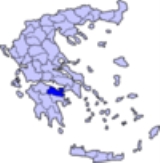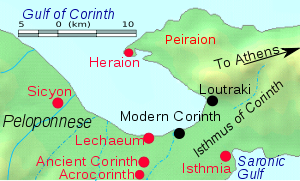
Battle of Lechaeum
Encyclopedia
The Battle of Lechaeum (391 BC) was an Athenian victory in the Corinthian War
. In the battle, the Athenian
general Iphicrates
took advantage of the fact that a Sparta
n hoplite
regiment operating near Corinth
was moving in the open without the protection of any missile throwing troops. He decided to ambush it with his force of javelin throwers, or peltast
s. By launching repeated hit-and-run attacks against the Spartan formation, Iphicrates and his men were able to wear the Spartans down, eventually routing them and killing just under half. This marked one of the first occasions in Greek military history on which a force of peltasts had defeated a force of hoplites (heavy infantry).
was defeated and exiled by anti-Spartan democrats. Those exiles cooperated with Spartan forces in the region to gain control of Corinth's port on the Corinthian Gulf, Lechaeum. They then repulsed several attacks on the port by the democrats at Corinth and their Theban and Argive
allies and secured their hold over the port.
The Athenians then sent out a force to assist in garrisoning Corinth, with Iphicrates commanding the peltasts. The Spartans and the exiles, meanwhile, raided Corinthian territory from Lechaeum, and in 391 BC King Agesilaus
led a large Spartan army to the area and attacked a number of strong points, winning a number of successes. The Athenians and their allies were largely bottled up in Corinth, but eventually found an opportunity to take advantage of Spartan negligence.
 The Athenian commanders in Corinth, Iphicrates, who commanded the peltasts, and Callias, who commanded the hoplites, saw that an entire Spartan mora, or regiment, of 600 men was marching past the city unprotected by either peltasts or cavalry, and decided to take advantage of this fact. Accordingly, the Athenian hoplites drew up a little outside Corinth, while the peltasts went after the Spartan force in pursuit, flinging javelins at the Spartan hoplites.
The Athenian commanders in Corinth, Iphicrates, who commanded the peltasts, and Callias, who commanded the hoplites, saw that an entire Spartan mora, or regiment, of 600 men was marching past the city unprotected by either peltasts or cavalry, and decided to take advantage of this fact. Accordingly, the Athenian hoplites drew up a little outside Corinth, while the peltasts went after the Spartan force in pursuit, flinging javelins at the Spartan hoplites.
To stop this, the Spartan commander ordered some of his men to charge the Athenians, but the peltasts fell back, easily outrunning the hoplites, and then, when the Spartans turned to return to the regiment, the peltasts fell upon them, flinging spears at them as they fled, and inflicted casualties. This process was repeated several times, with similar results. Even when a group of Spartan cavalrymen arrived, the Spartan commander made the curious decision that they should keep pace with the hoplites in pursuit, instead of racing ahead to ride down the fleeing peltasts. Unable to drive off the peltasts, and suffering losses all the while, the Spartans were driven back to a hilltop overlooking Lechaeum. The men in Lechaeum, seeing their predicament, sailed out in small boats to as close as to the hill as they could reach, about a half mile away. The Athenians, meanwhile, began to bring up their hoplites, and the Spartans, seeing these two developments, broke and ran for the boats, pursued by the peltasts all the way. All in all, in the fighting and pursuit, 250 of the 600 men in the regiment were killed.
Corinthian War
The Corinthian War was an ancient Greek conflict lasting from 395 BC until 387 BC, pitting Sparta against a coalition of four allied states; Thebes, Athens, Corinth, and Argos; which were initially backed by Persia. The immediate cause of the war was a local conflict in northwest Greece in which...
. In the battle, the Athenian
Athens
Athens , is the capital and largest city of Greece. Athens dominates the Attica region and is one of the world's oldest cities, as its recorded history spans around 3,400 years. Classical Athens was a powerful city-state...
general Iphicrates
Iphicrates
Iphicrates was an Athenian general, the son of a shoemaker, who flourished in the earlier half of the 4th century BC....
took advantage of the fact that a Sparta
Sparta
Sparta or Lacedaemon, was a prominent city-state in ancient Greece, situated on the banks of the River Eurotas in Laconia, in south-eastern Peloponnese. It emerged as a political entity around the 10th century BC, when the invading Dorians subjugated the local, non-Dorian population. From c...
n hoplite
Hoplite
A hoplite was a citizen-soldier of the Ancient Greek city-states. Hoplites were primarily armed as spearmen and fought in a phalanx formation. The word "hoplite" derives from "hoplon" , the type of the shield used by the soldiers, although, as a word, "hopla" could also denote weapons held or even...
regiment operating near Corinth
Corinth
Corinth is a city and former municipality in Corinthia, Peloponnese, Greece. Since the 2011 local government reform it is part of the municipality Corinth, of which it is the seat and a municipal unit...
was moving in the open without the protection of any missile throwing troops. He decided to ambush it with his force of javelin throwers, or peltast
Peltast
A peltast was a type of light infantry in Ancient Thrace who often served as skirmishers.-Description:Peltasts carried a crescent-shaped wicker shield called pelte as their main protection, hence their name. According to Aristotle the pelte was rimless and covered in goat or sheep skin...
s. By launching repeated hit-and-run attacks against the Spartan formation, Iphicrates and his men were able to wear the Spartans down, eventually routing them and killing just under half. This marked one of the first occasions in Greek military history on which a force of peltasts had defeated a force of hoplites (heavy infantry).
Prelude
In 392 BC, a civil war had taken place at Corinth, in which a group of pro-Spartan oligarchsOligarchy
Oligarchy is a form of power structure in which power effectively rests with an elite class distinguished by royalty, wealth, family ties, commercial, and/or military legitimacy...
was defeated and exiled by anti-Spartan democrats. Those exiles cooperated with Spartan forces in the region to gain control of Corinth's port on the Corinthian Gulf, Lechaeum. They then repulsed several attacks on the port by the democrats at Corinth and their Theban and Argive
Argos
Argos is a city and a former municipality in Argolis, Peloponnese, Greece. Since the 2011 local government reform it is part of the municipality Argos-Mykines, of which it is a municipal unit. It is 11 kilometres from Nafplion, which was its historic harbour...
allies and secured their hold over the port.
The Athenians then sent out a force to assist in garrisoning Corinth, with Iphicrates commanding the peltasts. The Spartans and the exiles, meanwhile, raided Corinthian territory from Lechaeum, and in 391 BC King Agesilaus
Agesilaus
Agesilaus was a Greek historian who wrote a work on the early history of Italy, fragments of which are preserved in Plutarch's "Parallel Lives", and in Stobaeus' Florilegium....
led a large Spartan army to the area and attacked a number of strong points, winning a number of successes. The Athenians and their allies were largely bottled up in Corinth, but eventually found an opportunity to take advantage of Spartan negligence.
Battle
While Agesilaus moved about Corinthian territory with the bulk of his army, he left a sizable force at Lechaeum to guard the port. Part of this force at Lechaeum was composed of men from the city of Amyclae, who traditionally returned home for a certain religious festival when on campaign. With this festival approaching, the Spartan commander at Lechaeum marched out with a force of hoplites and cavalry to escort the Amyclaeans past Corinth on their way home. After successfully leading his force well past the city, the commander ordered his hoplites to turn and return to Lechaeum, while the cavalry continued on with the Amyclaeans. Although he would be marching near the walls of the city of Corinth with his force, he expected no trouble, believing that the men in the city were thoroughly cowed and unwilling to march out.
To stop this, the Spartan commander ordered some of his men to charge the Athenians, but the peltasts fell back, easily outrunning the hoplites, and then, when the Spartans turned to return to the regiment, the peltasts fell upon them, flinging spears at them as they fled, and inflicted casualties. This process was repeated several times, with similar results. Even when a group of Spartan cavalrymen arrived, the Spartan commander made the curious decision that they should keep pace with the hoplites in pursuit, instead of racing ahead to ride down the fleeing peltasts. Unable to drive off the peltasts, and suffering losses all the while, the Spartans were driven back to a hilltop overlooking Lechaeum. The men in Lechaeum, seeing their predicament, sailed out in small boats to as close as to the hill as they could reach, about a half mile away. The Athenians, meanwhile, began to bring up their hoplites, and the Spartans, seeing these two developments, broke and ran for the boats, pursued by the peltasts all the way. All in all, in the fighting and pursuit, 250 of the 600 men in the regiment were killed.

